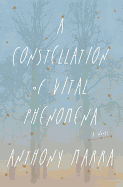
"It was of this death that I was reminded by the crushed thistle in the midst of the plowed field." The last line of Hadji Murad, Tolstoy's near-perfect novella and his final work about an Avar rebel commander among Muslim Chechans and their Russian occupiers, is also the epigraph to Anthony Marra's stunning, dazzlingly good first novel, A Constellation of Vital Phenomena.
It's set in Eldar, Chechnya, in 2004. Eldar, the "type of village one would only stumble upon when lost," is suffering horribly under the vicious rule of the Russians. The novel begins: "On the morning after the Feds burned down her house and took her father [Dokka], Havaa woke from dreams of sea anemones." Dokka's close friend and neighbor, Akhmed, found the eight-year old girl hiding nearby in the forest, sitting on the already-packed suitcase her father had told her to always keep by her door. "He held her like a bundle of loose sticks in his arms, carried her to his house and with a damp towel wiped the ash from her forehead." They must leave before the Feds return; they step out into the cold and snow and begin walking, careful to avoid mines. To Akhmed, "she seemed an immense and overwhelming creature whom he was destined to fail."
He takes her to the hospital in Volchansk where he was born; the city looked like it was "made of shoeboxes and stamped into the ground by a petulant child." Here he meets Sonja Andreyevna Rabina, an ethnic Russian and an accomplished surgeon, the last of a staff of 500; she has amputated 1,643 legs. Living on pills, she's "engulfed by the burden of care," as devastated as her hospital, worried about her missing sister, Natasha. She takes pity on them and lets them stay. Akhmed, a barely capable doctor in his village, can help her.
The novel takes place over five days, but the telling weaves in and out of the previous eight years. In those chapters we learn Sonja was educated overseas and returned to help her country's wounded. She cares for her sister who is an addict. She works a deal with a smuggler to get badly needed supplies, as well as books on psychology that might help her "treat" Natasha. We also learn about Khassan, who for years has been writing a 44,388-page history of his country, and his son, traitorous Ramzan, who turns in townspeople--they "disappear." The day Dokka was taken by the Feds the first time and later returned from the Landfill with all of his fingers gone (removed with a bolt cutter), while "Ramzan was only missing his hat," was the last day Khassan spoke to his son. Akhmed cauterized the ends with a heated butcher's blade; he felt like a man "asked to put out a forest fire with only the water he could carry in his mouth."
Marra's recounting of Khassan leaving a prison camp in 1956 after Stalin fell and going to retrieve the bodies of his parents from a nearby cemetery is almost unbearable: "They were lighter than he expected.... He packed them tenderly within the discolored suitcase lining" and took them home for burial. Hundreds more were there to "return their dead, and the dust reddened the night." The book is filled with such closely observed, beautifully told incidents. Evil returns to Chechnya in the '90s. A friend of Sonja's tells her that Stalin has been resurrected. "I know," Sonja replied, "He's the prime minister of Russia."
Marra takes us on an extraordinary journey into a world little known to many of us, into the intersecting lives and minds of its wretched people. Like Tolstoy's thistle, he tells us of little things that carry great significance: a chess set, a kinzhal knife, a portrait attached to a tree, a Makarov pistol. He slowly unfolds his story's past and present with a balanced sureness and a subtlety rare in a first novel, with a rhythm that is graceful and welcoming. Comparisons will be made to The Tiger's Wife, The Orphan Master's Son and Lost City Radio--all debut novels, all set in foreign lands, each one powerful and affecting--and rightfully so. The best novels take you into a world so full and realized, so gratifying and satisfying, that you don't want to leave and are saddened when, with the novel's end, you are banished from it. But you take that world with you and can revisit it in memory whenever you want.
A Constellation of Vital Phenomena creates such a world. Although it's sometimes horrific in its painful telling, it's also beautiful, heartbreaking and filled to the brim with the vital "human matter" of life. It may be the best new novel you'll read this year. --Tom Lavoie

